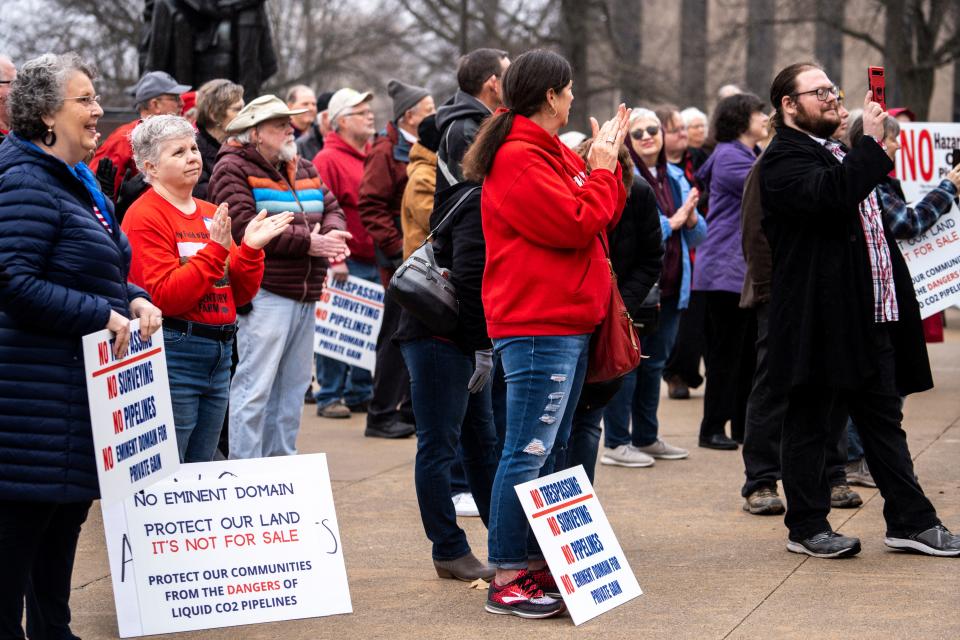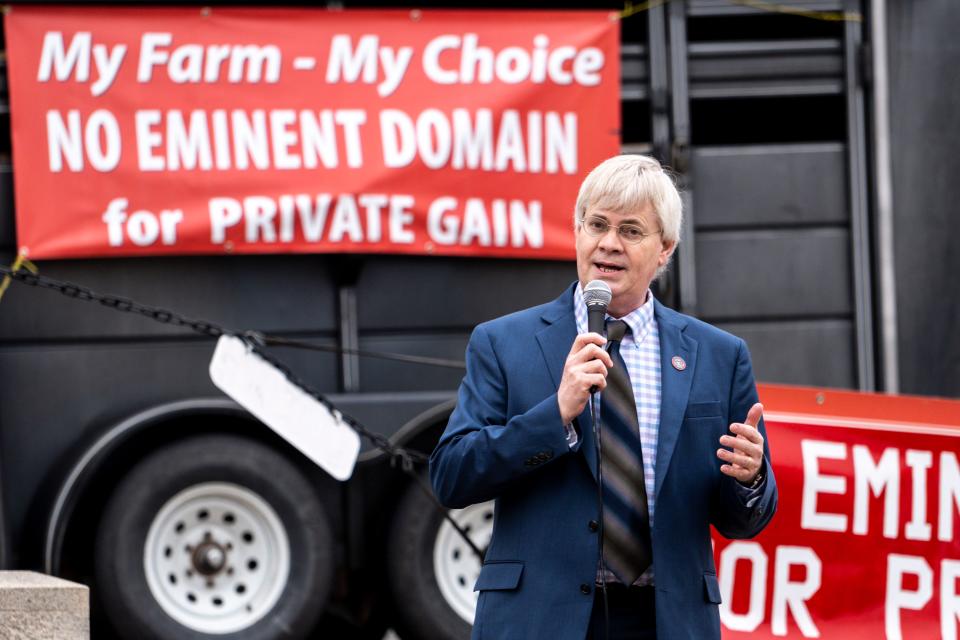Iowa House passes new limits on when carbon pipeline companies could use eminent domain
Carbon capture pipeline companies would need to reach voluntary deals to buy 90% of the land on their route before they could seek to use eminent domain, under a bill passed Wednesday by the Iowa House.
The bill's House passage is a big step forward for opponents of the pipelines, who are worried they could be forced to sell their land to the companies if the state grants them eminent domain powers.
Renewable fuels groups contend the bill would amount to a de facto ban on the pipelines and harm Iowa's ethanol industry.
House lawmakers amended the legislation Wednesday to remove a number of restrictions on pipeline companies, angering opponents who wanted stronger action.
The measure now faces an uphill climb in the Iowa Senate, where a range of bills seeking to restrict eminent domain failed to clear a legislative deadline earlier this month. Most of those bills did not receive hearings.
More:Iowa Poll: Strong majority opposes using eminent domain for carbon-capture pipelines
The House voted 73-20 to pass the bill Wednesday afternoon. It was a vote that did not fall along the chamber's typical partisan divisions, with nine Republicans and 11 Democrats voting no.
The bill's floor manager, Rep. Steven Holt, R-Denison, said the legislation is about protecting Iowans' private property rights.
"Regardless of the economic gain or the benefit to certain industries or groups of people, this fundamental liberty must not be for sale," Holt said in his closing comments. "If these pipeline projects are essential to ethanol and agriculture, let them be built through voluntary easements and not by allowing the blunt force of government to be used to shatter this fundamental birthright we all share as Americans."
Will the bill harm the ethanol industry? Opponents say yes. Supporters call 'BS'
Ethanol industry groups have fiercely opposed any restrictions on the pipelines' ability to use eminent domain. In industry-funded studies, they've warned that Iowa agriculture faces steep financial losses if the pipelines are not completed.
The most recent study said farmers statewide would lose $1 billion in annual farm income if the pipelines aren't built. A previous report said that without the projects the ethanol industry would lose about three-fourths of its production to neighboring states in the next five to 10 years.
More:Iowa farmers face $1 billion-a-year hit to income without carbon pipelines, report says

The Iowa Renewable Fuels Association, which represents the ethanol industry, blasted the House legislation in a statement, saying that it unfairly singles out carbon capture and sequestration projects.
“We are disappointed that the Iowa House singled out CCS projects with what in reality is an effective ban,” said Monte Shaw, the group's executive director. “If this is about property rights, why doesn’t the legislation impact all projects? If this is about safety, why doesn’t the bill apply to pipelines that carry explosive or flammable substances?"
Rep. Bobby Kaufmann, R-Wilton, one of the legislation's main supporters and a farmer, said it's a myth that the bill would kill the ethanol industry in Iowa.
He questioned the timing of the studies that he said appeared "magically" just before the House debated the issue.
"The notion that this piece of legislation is going to kill the ethanol industry, there’s a lot of four-letter words I could use to describe that, and I will not do that," Kaufmann said. "So I’ll just call it BS."
Three companies are seeking to build pipelines across Iowa: Summit Carbon Solutions, Navigator CO2 Solutions and Wolf Carbon Solutions. The projects would transport liquefied carbon dioxide from ethanol plants to underground sequestration sites in North Dakota and Illinois.
Kaufmann said the companies don't need eminent domain to build the pipelines.
"You look at other projects shipping energy and they have not only achieved their goal of construction, they did it with almost 100% voluntary easements," he said.
He pointed to Wolf, which recently filed an application with the Iowa Utilities Board that said the company does not intend to seek eminent domain for its project. Summit and Navigator have each filed permits seeking to use eminent domain.
All three companies have emphasized that they are working with landowners along their proposed routes. Summit said it has reached voluntary agreements with 70% of the landowners along its route.
"This overwhelming level of support is a clear reflection that Iowa landowners view the project as critical to supporting the state's most important industries — ethanol and agriculture," the company said in a statement.
What would the House's eminent domain bill do?
House File 565 would require carbon capture pipeline companies to reach voluntary deals to buy 90% of the land on their routes before they could seek to use eminent domain, and to submit regular reports on their progress.
Landowners would also have recourse to pursue action against pipeline companies in court or at the Iowa Utilities Board if their land suffers issues such as reduced crop yield, poor drainage, soil erosion or compaction or loss of value as a result of any pipelines that run across their property.
The bill would also create a legislative committee to study Iowa's eminent domain practices and procedures and make recommendations for future improvements.
House Republican lawmakers amended the bill Wednesday to remove a host of other restrictions for pipeline companies, including complying with all local ordinances, waiting to begin pipeline construction until new federal rules are adopted and securing permits in all other states on the pipelines' routes before they could build in Iowa.
Polling has shown eminent domain is unpopular among the vast majority of Iowans. More than three-fourths of Iowans (78%) say they oppose carbon capture pipeline companies using eminent domain for their projects, according to a Des Moines Register/Mediacom Iowa Poll this month.
Some wanted the bill to go further. Others said it wouldn't achieve its goals.
Lawmakers offered a myriad of reasons for supporting or opposing the bill during House debate Wednesday.
Rep. Norlin Mommsen, R-DeWitt, a farmer, offered an amendment that would have replaced the bill with language that would not have changed the state's eminent domain rules but would have provided guidelines for how pipeline companies could negotiate with landowners.
"People aren’t being treated like they should be with decent respect, so let’s sit down and give them the respect they deserve," he said.
His amendment was ruled not germane to the bill and did not receive a vote. Rep. Chad Ingels, R-Randalia, who is also a farmer, said that was disappointing.

"I’m under no illusion that if we pass this bill today with (the) 90% number in there the Senate’s going to take it up," he said. "So then where are we? Landowners have no additional protections that they’re seeking."
Rep. Chuck Isenhart, D-Dubuque, said he has doubts about the impact carbon capture pipelines will have on fighting climate change. And he said the 90% threshold would leave the final 10% of landowners under immense pressure to sell their land.
"If a majority of this body believes that carbon dioxide pipelines are without public merit, then have the courage to simply block their construction by law," Isenhart said. "Don’t put the burden of the decision on a small group of landowners to hold out, resulting in, no doubt, a besiegement if the bill becomes law."
Rep. Sharon Steckman, D-Mason City, said the town hall meetings she's held in her district this year have been full of people opposed to the pipelines. She said she was voting for the bill because she was listening to those constituents.
"We would not be here doing this bill at all if you had not spoken up and made your voice heard loud and clear," she said. "You are the only reason this bill is coming to the floor for debate. I hear you. Democrats hear you. We are listening. I applaud your advocacy and your voice and I am a strong yes for you."
Pipeline opponents rally ahead of House vote
A few dozen landowners and other pipeline opponents rallied outside the Iowa Capitol Wednesday morning ahead of the vote, seeking to pressure lawmakers to pass the bill.
Kim Junker, a Butler County corn farmer, called the ethanol industry's study about the pipelines' economic impact "BS."
More:Landowners are pressuring Iowa lawmakers to limit eminent domain. Do they have a chance?
"If the ethanol industry is so fragile, why would we allow our farms to be destroyed for an industry that’s on the verge of collapse?" she said. "If the ethanol industry is so fragile, why are they claiming that 2022 was a year of record-breaking profits?"
It was the latest in a series of events that farmers, environmentalists and other critics have staged at the Capitol this year. Their advocacy campaign has also included traveling to lawmakers' town hall meetings around the state and calling and emailing legislators seeking to get their position on the record.
Sen. Jeff Taylor, R-Sioux Center, introduced five bills this year to ban or restrict eminent domain for pipelines, none of which received hearings. He encouraged the crowd to keep the pressure on lawmakers.
"What I find sad is that with a supposedly conservative Republican majority on both sides of this Capitol building, we can’t get a good, strong, consistent protection bill this session for you and for Iowans in general," Taylor said. "That’s sad."

But while Taylor said he was disappointed in the amendments that "watered down and weakened" the House bill, he said he still believes it's to the advantage of opponents to see it move forward.
"Because that will come to the Senate and it’s going to put the spotlight and the pressure on the Senate," he said. "And hopefully we will rise to the occasion and do something."
Des Moines Register reporter Donnelle Eller contributed reporting.
Stephen Gruber-Miller covers the Iowa Statehouse and politics for the Register. He can be reached by email at sgrubermil@registermedia.com or by phone at 515-284-8169. Follow him on Twitter at @sgrubermiller.
This article originally appeared on Des Moines Register: Iowa House passes bill restricting eminent domain to build pipelines

